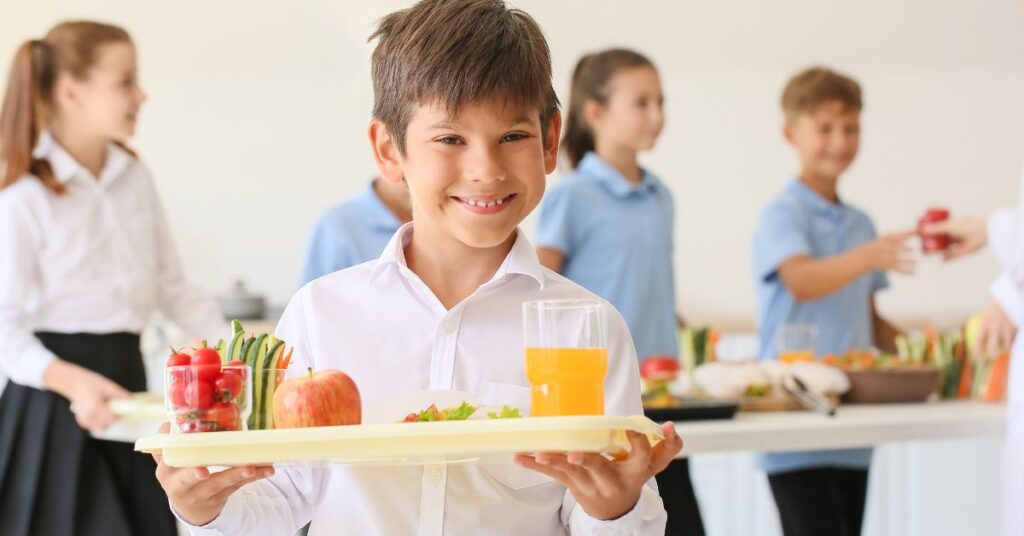

The following is an article from a Community Grant recipient.
The incidence of learning and behavioral problems in children is rising. Thirty years ago, teachers often had only one or two students with attention deficit hyperactivity disorder (ADHD) in a classroom, one child on the autism spectrum in the entire building, and a few children with allergies sprinkled about; the prevalence of these diagnoses have all drastically increased.[1]–[4] In my routine visits for school consultation, I often see dozens of children lined up at the front office to receive their afternoon medication.
Several factors have been blamed for these alarming trends: video games, addictive smartphone use, and social media are commonly accused of negatively impacting our learning ability.[5][6] While less frequently blamed, poor nutrition is arguably more crucial than all those factors.
The average American diet contradicts common sense. We would not deliberately feed our children Clorox but do feed them cocktails of sugary, chemically laced, denatured, artificial, and indigestible processed foods. These foods wreak havoc on the hormonal, nervous, and immune systems. “[A] high fat or high sugar diet has pronounced and enduring detrimental effects on cognition, behavior, and learning,” writes the author of a review of junk food’s effects on the adolescent brain.[7] They conclude: “The heightened neuroplasticity during adolescence, however, offers a window in which diet-induced cognitive decline may be particularly amenable to intervention.” My experience confirms this research. Knowing what so many of the children I see eat, I am not at all surprised that they are often moody or tired or that teachers struggle so much with irritability, outbursts, anxiety, and boredom.
Of course, these problems are not limited to children. The US Surgeon General’s 2024 advisory on parents’ mental health and well-being paints a grim picture: nearly half of American parents report being completely overwhelmed by stress most days, a rate far greater than that of nonparents.[8] Common sources of stress include worrying about family finances and the health and safety of their children, both of which can be at least partly addressed by prioritizing healthier dietary choices. Unfortunately, added stress often contributes to poor food choices, creating a vicious cycle. Our hectic lifestyles promote the McDonaldization (a term coined by sociologist George Ritzer in 1993) of the family institution. Overwhelmed parents seeking efficiency and predictability may turn to junk food for easy relief.
The radical alternative of involving the entire family in the daily ritual of selecting and preparing nutritious food has profound and immediate benefits. Just as people often say the family that prays together stays together, it is also true that the family that eats together has better outcomes:[9]
- lower rates of disordered eating
- better academic performance
- higher self-esteem
- lower risk of substance abuse and suicidal ideation.
Anyone who can get their children involved in the cooking process will be even better off. Cooking as a family helps children make informed dietary decisions and teaches them the lifelong lesson of prioritizing quality time with family.

Our Nutrition 4 the Growing Brain program is designed to inform parents about the link between toxic foods and their children’s behavioral and academic performance. We introduce parents and children to a whole food, plant-based (WFPB) diet, menu planning, preparing grocery lists, and delicious recipes to help them change their habits. Participants leave the program ready to create and sustain lifestyle changes; once they have firsthand experience of the benefits of a predominantly organic, low-glycemic, plant-based diet that is free of animal foods, low in sodium, and with little to no added oils, they’re also likely to spread the word to other families. Through our unique assessment of a family’s pantry, we help parents see the myth of convenience, which empowers them to change their food habits.
Thanks to financial support from the T. Colin Campbell Center for Nutrition Studies, we are better equipped to conduct tasters, demos, and hands-on cooking classes. We’re launching three virtual cooking classes—one to cover each meal of the day—and conducting ten live cooking demonstrations and tasters for families of five. There will also be a field trip to an organic farm for activities and a picnic. Our education materials will draw on scientific studies and anecdotal stories from families that comprise The Family Advocates’ network. The project will serve 150 participants (100 virtual, 50 in person), with 15 lucky participants attending the farm picnic.
Our long-term goals include 1) training half a dozen early interventionists, individuals who will be able to go into homes and assess pantries, teach cooking, and provide nutritional guidelines to families, 2) partnering with local community food activists to help families grow their own food, and 3) building out our center to host interactive cooking classes for multiple families at a time. In the meantime, we are creating our first workbook, The 21-Day Makeover—Family, Food, and Fun.
Our grassroots program has already helped many families. We helped a stay-at-home dad who was on dialysis improve his health and bond with his children. We helped grandparents who had adopted their special needs grandson, and we helped him improve his classroom performance. We helped a teenage girl with anger outbursts and a disrupted menstrual cycle. It’s so important that parents know they can help their children concentrate in class, get along with others, and develop their talents by eating better. Dietary interventions can and should be used as brain medicine, and that is exactly what we will continue to do.
References
- Abdelnour E, Jansen MO, Gold JA. ADHD Diagnostic Trends: Increased Recognition or Overdiagnosis?. Mo Med. 2022;119(5):467-473.
- Nevison C, Zahorodny W. Race/Ethnicity-Resolved Time Trends in United States ASD Prevalence Estimates from IDEA and ADDM. J Autism Dev Disord. 2019;49(12):4721-4730. doi:10.1007/s10803-019-04188-6
- Shanahan L, Zucker N, Copeland WE, Costello EJ, Angold A. Are children and adolescents with food allergies at increased risk for psychopathology?. J Psychosom Res. 2014;77(6):468-473. doi:10.1016/j.jpsychores.2014.10.005
- ADDitude Editors. ADHD statistics: new ADD facts and research. ADDitudemag.com. April 6, 2020. Online access: https://www.additudemag.com/statistics-of-adhd/
- Chan PA, Rabinowitz T. A cross-sectional analysis of video games and attention deficit hyperactivity disorder symptoms in adolescents. Ann Gen Psychiatry. 2006;5(16). doi:10.1186/1744-859X-5-16
- Al-Natour M, Al-Ajlouni K, Alkhamra H. The impact of smartphone addictive use by students with learning disabilities on social, psychological and academic domains. Int Journ of Innovation, Creativity, and Change. 2021;15(2):948-965. doi:10.53333/IJICC2013/15260
- Reichelt AC, Rank MM. The impact of junk foods on the adolescent brain. Birth Defects Res. 2017;109(20):1649-1658. doi:10.1002/bdr2.11731
- Office of the Surgeon General. Parents under pressure: The U.S. surgeon general’s advisory on the mental health & well-being of parents. 2024. Online access: https://www.hhs.gov/sites/default/files/parents-under-pressure.pdf
- Harrison ME, Norris ML, Obeid N, Fu M, Weinstangel H, Sampson M. Systematic review of the effects of family meal frequency on psychosocial outcomes in youth. Can Fam Physician. 2015;61(2):e96-e106.
Copyright 2026 Center for Nutrition Studies. All rights reserved.
Deepen Your Knowledge With Our
Plant-Based Nutrition
Certificate
Plant-Based Nutrition Certificate
- 23,000+ students
- 100% online, learn at your own pace
- No prerequisites
- Continuing education credits





